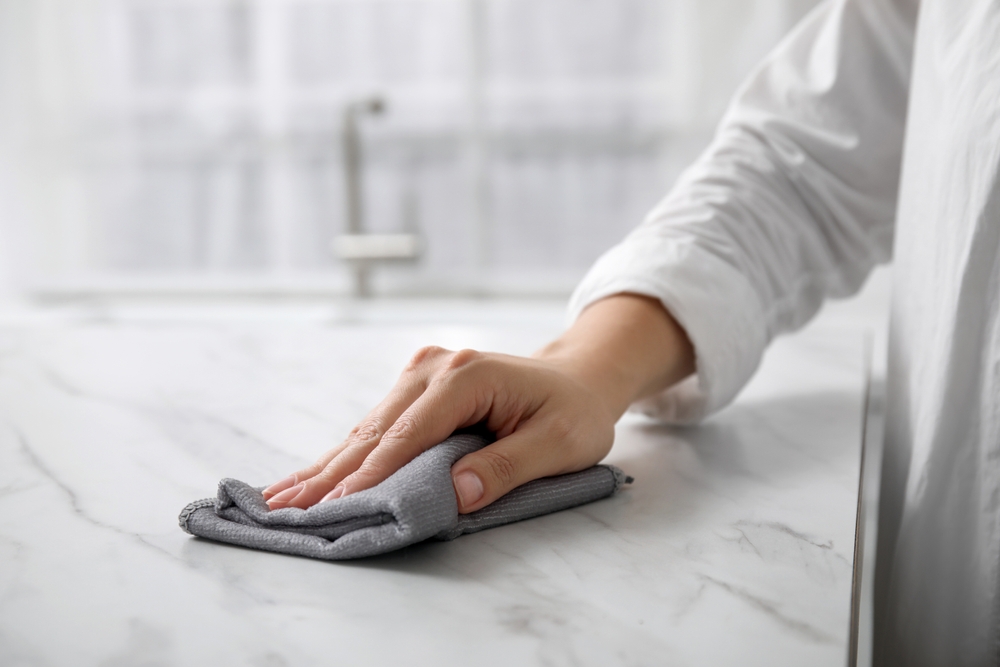Proper maintenance and regular cleaning are essential for keeping your stone countertops looking their best. Failure to take these important measures can result in unsightly stains, etching, and a decrease in the overall longevity of your countertops. Discover the important cleaning procedures for stone countertops to ensure their longevity for years to come.
In this blog, we’ll give you an in-depth look at the three basic types of stone countertops: granite, quartz, and cultured stone. Learn about each type’s distinct characteristics, composition, and maintenance requirements, which will help you make informed decisions about cleaning and caring for your individual stone countertop material.
Understanding Granite Countertops
Granite, as a natural stone, has great durability as well as a vast variety of distinct hues and patterns. Its durability against heat and scratches makes it a popular choice for countertops. To preserve the beauty and lifespan of granite countertops, some standard care and maintenance guidelines must be followed. These include sealing the surface on a regular basis, avoiding abrasive cleansers, utilizing cutting boards and trivets, and quickly cleaning up spills.
To clean granite countertops, use a pH-neutral cleaner designed exclusively for natural stone worktops. Avoid using harsh chemicals or acidic substances that can etch the sealant. For mild cleaning, use a soft cloth or sponge, and then thoroughly dry the surface.
Caring for Quartz Countertops
Quartz countertops are engineered stone surfaces that are extremely durable, stain resistant, and available in a broad range of hues and styles. Because they are non-porous and do not require sealing, they are a low-maintenance solution. Quartz countertops, as opposed to granite, are comprised of crushed quartz combined with resin and colors. They have a more uniform appearance and are less heat resistant than granite, but they are more resistant to stains and scratches.
Remember to use trivets or hot pads for hot objects, avoid abrasive cleaners and harsh chemicals, and promptly wipe up spills. Regular cleaning with mild soap and water is usually sufficient. For safe and effective cleaning of quartz surfaces, a non-abrasive cleaner or a mixture of dish soap and water can be used. Avoid scrubbing with abrasive sponges or pads that may scratch the surface. Rinse thoroughly and dry the countertop after cleaning to prevent water spots.
Cultured Marble and Cultured Granite Countertops
Cast polymer products, such as cultured marble and cultured granite, are engineered materials made from a combination of natural stone particles, resins, and pigments. They offer a cost-effective alternative to natural stone countertops. Cultured marble and cultured granite have specific care requirements, making them suitable for bathroom countertops but not kitchen countertops. They’re to avoid excessive heat, harsh chemicals, and abrasive cleaners. Use non-abrasive cleaning solutions and soft cloths to prevent scratching or damaging the surface.
To maintain the luster of cultured granite and cultured marble countertops, it is important to prevent prolonged exposure to acidic substances, such as citrus juices or vinegar. Promptly clean up spills to prevent staining. Cleaning methods typically involve using mild, non-abrasive cleaners specifically formulated for these surfaces. Avoid using abrasive sponges or scouring pads, as they can scratch the surface. Rinse thoroughly and dry the countertop after cleaning to prevent water spots and maintain its appearance.
Top Tips for Maintaining Beautiful Stone Countertops
Regular cleaning and maintenance are vital for stone countertops to preserve their beauty, durability, and longevity. Neglecting these practices can lead to stains, etching, and damage that may be difficult to repair. We’ve discussed the unique care requirements, recommended cleaning products, and common mistakes to avoid for each type of stone surface. By following proper care techniques and using non-abrasive cleaners, you can enjoy beautiful and resilient countertops for years to come.
Contact our team of stone countertops experts to learn more about maintaining kitchen and bathroom countertops.







![6 Stunning Stone Kitchen Countertop Color Ideas [Infographic]](https://www.rdmarble.com/site/wp-content/uploads/2024/06/In-home-floors-2-400x250.jpg)